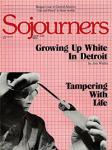From April 20 to 24 I participated in the Christian World Conference on Life and Peace in Uppsala, Sweden, where I was one of 133 delegates from 60 countries. It was the broadest gathering of church leaders I had ever attended. We came from Protestant, Roman Catholic, and Orthodox churches, from both East and West, from the so-called First, Second, and Third Worlds.
Most of those who gathered in Uppsala were heads of churches and communions, bishops, archbishops, and cardinals, with a few of us representing movements in the church's life. The conference was called and convened by the leaders of the Scandanavian churches in response to the urgent nuclear threat.
An initial draft of the conference statement was very moderate, predictable, and, in my view, inadequate. In response to the first draft, a strong bond began to emerge between the younger generation of American and European delegates and the Third World church leaders. Both groups were unhappy with the first statement, and together we pressed for a much stronger commitment to the vital link between peace and justice and a clear rejection of nuclear weapons.
To the astonishment of many of us, the stronger language proposed was incorporated into the second draft of the conference message. The new draft clearly links the struggle for peace and the labor for justice as parts of the same movement. The statement fundamentally challenges and rejects the doctrine of nuclear deterrence, explicitly condemning the very possession of nuclear weapons as contrary to the will of God.
These strong commitments expressed the majority view of the assembly. The voices objecting to the wording of the second draft were from the United States and Europe. In what I believe was an important gesture of reconciliation, the minority view was incorporated into the document. The crucial section now reads:
Most of us believe that from the Christian standpoint, reliance upon the threat and possible use of nuclear weapons is unacceptable as a way of avoiding war. Some are uniting to tolerate nuclear deterrence only as a temporary measure in the absence of alternatives. To most of us, however, the possession of nuclear weapons is inconsistent with our faith in God, our concept of creation, and with our membership in Christ's universal body. Nuclear deterrence is essentially dehumanizing, it increases fear and hatred, and entrenches confrontation between "the enemy and us." Most of us, therefore, believe that the existence of these weapons contradicts the will of God.
The statement urges many political initiatives on the nuclear powers, including a freeze on further manufacture and deployment of nuclear weapons, pledges of no first use, nuclear-free zones, confidence-building measures, unilateral actions for peace, and principles of self-determination and non-interference. But even more significantly, the document calls the churches to a new level of study, prayer, and forthright action, including, "to encourage Christians to non-cooperation with preparations for nuclear war" and "to encourage Christians to explore the possible nonviolent use of civil disobedience as an effective means of protesting against nuclear arms."
These clear commitments gained the major support of the delegates gathered in Uppsala. The statement that has emerged from the Life and Peace conference is the strongest thus far from any body of prominent church leaders. The breadth and stature of the church leadership represented adds to the significance of the statement. Justice and peace were drawn closer together in Uppsala, and the bonds between many of us from the First, Second, and Third Worlds were significantly strengthened.
Although more than 200 journalists from Europe and the Third World covered the event, no American journalists were present in Uppsala. The conference and the message which emerged are worthy of wide attention in the American churches.
Of course, statements mean little if our words do not shape our actions. One line of the statement which was never debated may hold the key to how serious our peacemaking will be in the days ahead: "Work for peace with justice demands willingness to walk the way of the Cross and to take risks to self."
Jim Wallis is editor-in-chief of Sojourners.

Got something to say about what you're reading? We value your feedback!
